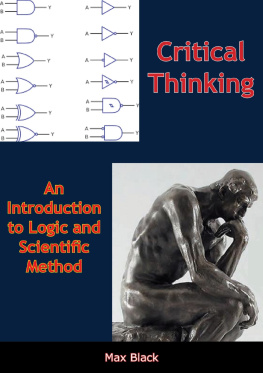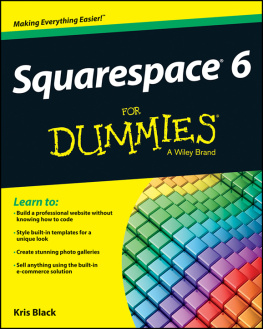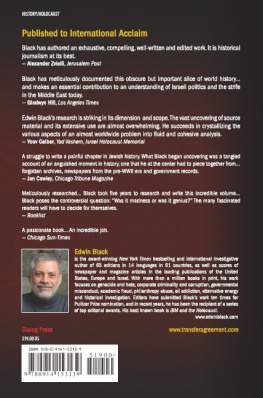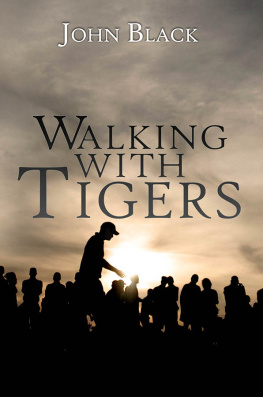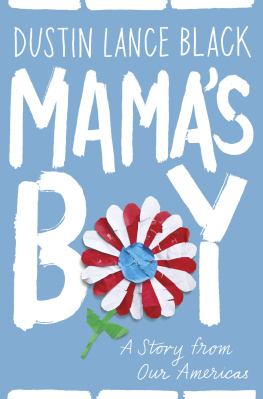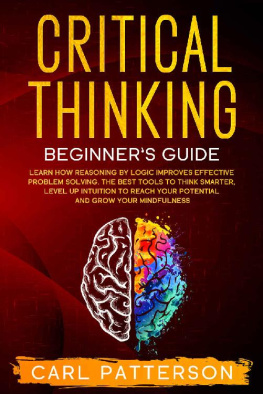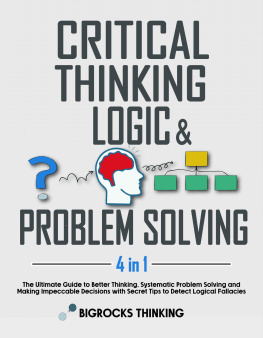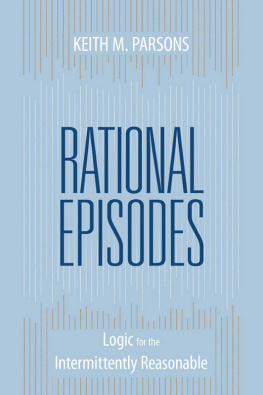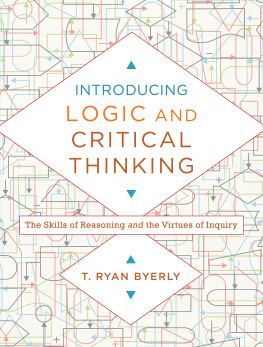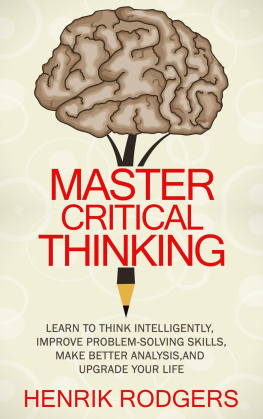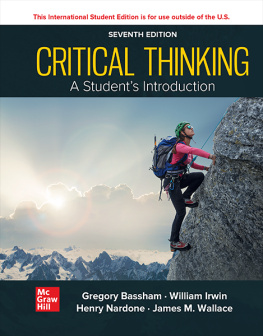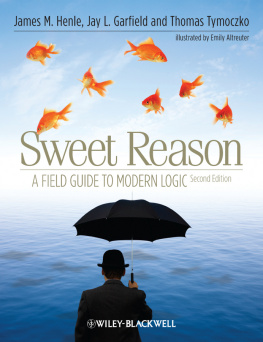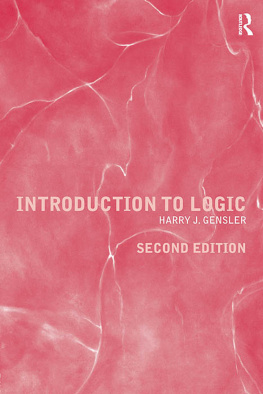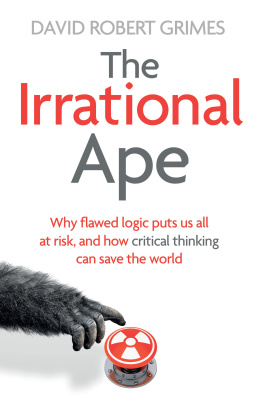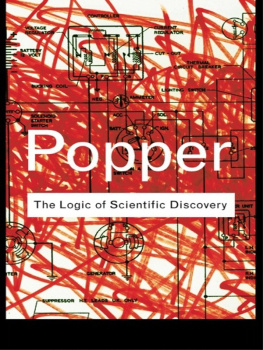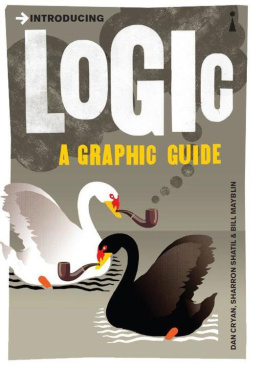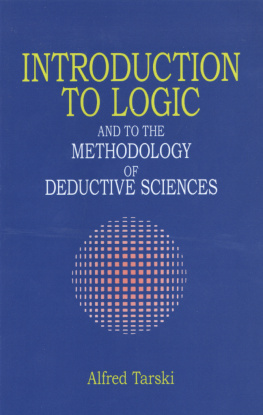Black - Critical Thinking : an Introduction to Logic and Scientific Method.
Here you can read online Black - Critical Thinking : an Introduction to Logic and Scientific Method. full text of the book (entire story) in english for free. Download pdf and epub, get meaning, cover and reviews about this ebook. City: Chicago, year: 2018, publisher: Muriwai Books, genre: Religion. Description of the work, (preface) as well as reviews are available. Best literature library LitArk.com created for fans of good reading and offers a wide selection of genres:
Romance novel
Science fiction
Adventure
Detective
Science
History
Home and family
Prose
Art
Politics
Computer
Non-fiction
Religion
Business
Children
Humor
Choose a favorite category and find really read worthwhile books. Enjoy immersion in the world of imagination, feel the emotions of the characters or learn something new for yourself, make an fascinating discovery.
Critical Thinking : an Introduction to Logic and Scientific Method.: summary, description and annotation
We offer to read an annotation, description, summary or preface (depends on what the author of the book "Critical Thinking : an Introduction to Logic and Scientific Method." wrote himself). If you haven't found the necessary information about the book — write in the comments, we will try to find it.
Black: author's other books
Who wrote Critical Thinking : an Introduction to Logic and Scientific Method.? Find out the surname, the name of the author of the book and a list of all author's works by series.
Critical Thinking : an Introduction to Logic and Scientific Method. — read online for free the complete book (whole text) full work
Below is the text of the book, divided by pages. System saving the place of the last page read, allows you to conveniently read the book "Critical Thinking : an Introduction to Logic and Scientific Method." online for free, without having to search again every time where you left off. Put a bookmark, and you can go to the page where you finished reading at any time.
Font size:
Interval:
Bookmark:


This edition is published by Muriwai Books www.pp-publishing.com
To join our mailing list for new titles or for issues with our books muriwaibooks@gmail.com
Or on Facebook
Text originally published in 1946 under the same title.
Muriwai Books 2018, all rights reserved. No part of this publication may be reproduced, stored in a retrieval system or transmitted by any means, electrical, mechanical or otherwise without the written permission of the copyright holder.
Publishers Note
Although in most cases we have retained the Authors original spelling and grammar to authentically reproduce the work of the Author and the original intent of such material, some additional notes and clarifications have been added for the modern readers benefit.
We have also made every effort to include all maps and illustrations of the original edition the limitations of formatting do not allow of including larger maps, we will upload as many of these maps as possible.
CRITICAL THINKING
AN INTRODUCTION TO LOGIC AND SCIENTIFIC METHOD
BY
MAX BLACK
Professor of Philosophy
Cornell University
Contents
To
NAOMI
and
JONATHAN
I have tried to make this book an argument, not a catalogue of dogmas. Its ideal reader will find himself constantly asking questions, for which he will insist on finding his own answers. To avoid wasting his time, I have made the fullest use of authentic illustrations from newspapers, books, and other contemporary sources.
One of the wisest things ever said about our subject is that Logic, like whiskey, loses its beneficial effect when taken in too large doses. While bearing this constantly in mind, I have also aimed at a high level of accuracy and the inclusion of nothing that would have to be unlearnt at a more advanced level of study.
This book could never have been written without the help of the students to whom I have lectured on logic and scientific method. My chief obligations are to them.
Logic ought to be easy, interesting, and enjoyable. This book will have been successful if it helps some readers to find it so.
The following authors and publishers have kindly allowed the use of quotations from the publications cited.
The American Association of University Professors: Make the war worth winning, by Howard Mumford Jones and Warner G. Rice.
D. Appleton-Century Company, Inc.: Illiteracy of the Literate , by H. R. Huse.
Sir Ernest Barker and the New York Times: The historian too must stand trial.
Professor C. A. Baylis: an exercise from Formal Logic (Prentice-Hall).
The Chicago Sun : Murray Bill Offers Jobs and Freedom.
Colliers Magazine: an editorial.
The Dial Press: The Flight From Reason , by Arnold Lunn.
E. P. Dutton & Co., Inc.: Selected Papers on Philosophy , by William James, and Common Sense and its Cultivation, by H. Hankin.
Fortune Magazine (by special permission of the editors): The edge of the abyss, by Alfred Noyes.
Ginn & Co.: Social Causation , by R. M. MacIver.
Mr. Samuel Grafton and the New York Post : Idea of keeping Hirohito on throne affronts logic.
Harcourt Brace and Company, Inc.: A Passage to India, by E. M. Forster, and The Tyranny of Words, by Stuart Chase.
Harvard University Press: The Study of the History of Science , by George Sarton.
Henry Holt and Company: Liberal Education , by Mark Van Doren.
Alfred A. Knopf, Inc.: How New Will the Better World Be? by Carl Becker.
The Macmillan Company: The Case For Christianity , by C. S. Lewis, and Science , Religion and the Future , by C. E. Raven.
W. W. Norton and Company, Inc.: The Scientific Outlook , by Bertrand Russell.
Random House, Inc.: The Wisdom of Confucius , ed. by Lin Yutang, and The Male Animal, by James Thurber and Elliott Nugent.
The editor of Science: Quotations from six articles.
The editor of The Scientific Monthly : quotations from two articles.
Sheed and Ward: a verse from Sonnets and Verse , by Hilaire Belloc.
Yale University Press: The Folklore of Capitalism, by Thurman Arnold.
Full references to the sources of the quotations will be found in the places of their occurrence in the text.
M. B.
1. It is wise to get a general view of a chapter before settling down to cases: read the summary at the end of each chapter first.
2. The comprehension tests at the end of each chapter can be of great help. If at first you do not agree with the answers given (page 396), think again. Very often there is an important point of emphasis or interpretation involved which you may have missed on the first reading.
3. Many examples are discussed and analyzed in the text. To obtain full benefit from them, think about them and formulate your own conclusions before reading the printed comment.
4. The exercises are as important as the text. The group labelled A consist mainly of relatively straightforward application of method or doctrine. The remainder, headed B, often raise critical questions about the discussions of the chapters to which they are attached. (A few really hard questions have been included to give you the fun of wrestling with them!)
5. The use of words in precise senses is of the greatest importance in critical thinking: be sure you have mastered the technical terms. For your convenience, they are printed in boldface type on their first appearance, and definitions are assembled in the glossary beginning on page 379.
6. The three parts of the book can be studied in relative independence of each other, but you are advised to read Part One first.
It is lack of logic that keeps us helpless in a world where thought goes on whether we like it or not, and goes on less well if we cannot contribute to it. Mark van Doren .
Logic can be briefly defined as the study of reasoning . The study of any subject calls for thought; and every student is, or ought to be, a thinker; but he is not a student of Logic unless he thinks about reasoning. Now reasoning is itself a special kind of thinking; hence the special kind of study known as Logic is concerned with thinking about thinking.
These remarks will become more illuminating as we become clearer about the differences between reasoning and other types of thinking.
What is reasoning? A group of people waiting to be interviewed were once asked by a psychologist to answer the question, What were you thinking about when the clock struck just now? Among the answers received were these:
1. I was wondering whether I would get the job.
2. I was trying to remember what book I had to buy for the course.
3. I was trying to decide whether it was worth waiting any longer.
4. I really cant sayI suppose I was just wool-gathering.
5. My young brother asked me this morning how a heavy airplane could float in airI was trying to figure out the answer.
All of these people were thinking, after a fashion, but only the last was reasoning. If he could have been made to think aloud, the following monologue might have been heard:
Nothing can float in a liquid or gas which is lighter than itself thats certain. Yet an airplane is heavier than airits even called a heavier-than-air machine sometimes. (Theres no problem with a balloonit simply floats.) There must be some extra supporting forcean upward force. Where does it come from? Could it be the propeller? But doesnt it drive air parallel to the wings? Yes thats itthe air current could still press upward on the plane.
Next pageFont size:
Interval:
Bookmark:
Similar books «Critical Thinking : an Introduction to Logic and Scientific Method.»
Look at similar books to Critical Thinking : an Introduction to Logic and Scientific Method.. We have selected literature similar in name and meaning in the hope of providing readers with more options to find new, interesting, not yet read works.
Discussion, reviews of the book Critical Thinking : an Introduction to Logic and Scientific Method. and just readers' own opinions. Leave your comments, write what you think about the work, its meaning or the main characters. Specify what exactly you liked and what you didn't like, and why you think so.

